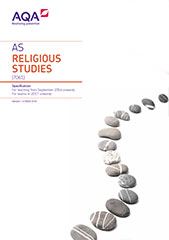3.1 Component 1: Philosophy of religion and ethics
Section A: Philosophy of religion
Students must develop knowledge and understanding of the following:
- the meaning and significance of the specified content
- the influence of these beliefs and teachings on individuals, communities and societies
- the cause and significance of similarities and differences in beliefs and teachings
- the approach of philosophy to the study of religion and belief.
The term ‘belief(s)’ includes religious beliefs and non-religious beliefs as appropriate.
They should be able to analyse and evaluate issues arising from the topics studied, and the views and arguments of the scholars prescribed for study.
Students should also be able to use specialist language and terminology appropriately.
Questions may be set that span more than one topic.
Arguments for the existence of God
Design
- Presentation: Paley’s analogical argument.
- Criticisms: Hume.
- Presentation: Anselm’s a priori argument.
- Criticisms: Gaunilo and Kant.
Cosmological
- Presentation: Aquinas' Way 3. The argument from contingency and necessity.
- Criticisms: Hume and Russell.
Students should study the basis of each argument in observation or in thought, the strengths and weaknesses of the arguments, their status as ‘proofs’, their value for religious faith and the relationship between reason and faith.
Evil and suffering
The problem of evil and suffering.
- The concepts of natural and moral evil.
- The logical and evidential problem of evil.
- Responses to the problem of evil and suffering.
- Hick’s soul making theodicy.
- The free will defence.
- Process theodicy as presented by Griffin.
- The strengths and weaknesses of each response.
Religious experience
The nature of religious experience.
- Visions: corporeal, imaginative and intellectual.
- Numinous experiences: Otto, an apprehension of the wholly other.
- Mystical experiences: William James; non sensuous and non-intellectual union with the divine as presented by Walter Stace.
Verifying religious experiences
- The challenges of verifying religious experiences.
- The challenges to religious experience from science.
- Religious responses to those challenges.
- Swinburne’s principles of credulity and testimony.
The influence of religious experiences and their value for religious faith.
Section B: Ethics and religion
Students must develop knowledge and understanding of the following:
- the meaning and significance of the specified content
- the influence of these beliefs and teachings on individuals, communities and societies
- the cause and significance of similarities and differences in beliefs and teachings
- the approach of philosophy to the study of religion and belief.
The term ‘belief(s)’ includes religious beliefs and non-religious beliefs as appropriate.
They should be able to analyse and evaluate issues arising from the topics studied, and the views and arguments of the scholars prescribed for study.
Students should also be able to use specialist language and terminology appropriately.
Questions may be set that span more than one topic.
Normative ethical theories
- Deontological: natural moral law and the principle of double effect with reference to Aquinas; proportionalism.
- Teleological: situation ethics with reference to Fletcher.
- Character based: virtue ethics with reference to Aristotle.
- The differing approaches taken to moral decision making by these ethical theories.
- Their application to the issues of theft and lying.
- The strengths and weaknesses of these ways of making moral decisions.
The application of natural moral law, situation ethics and virtue ethics to:
- Issues of human life and death:
- embryo research; cloning; ‘designer’ babies
- abortion
- voluntary euthanasia and assisted suicide
- capital punishment.
- Issues of non-human life and death:
- use of animals as food; intensive farming
- use of animals in scientific procedures; cloning
- blood sports
- animals as a source of organs for transplants.
